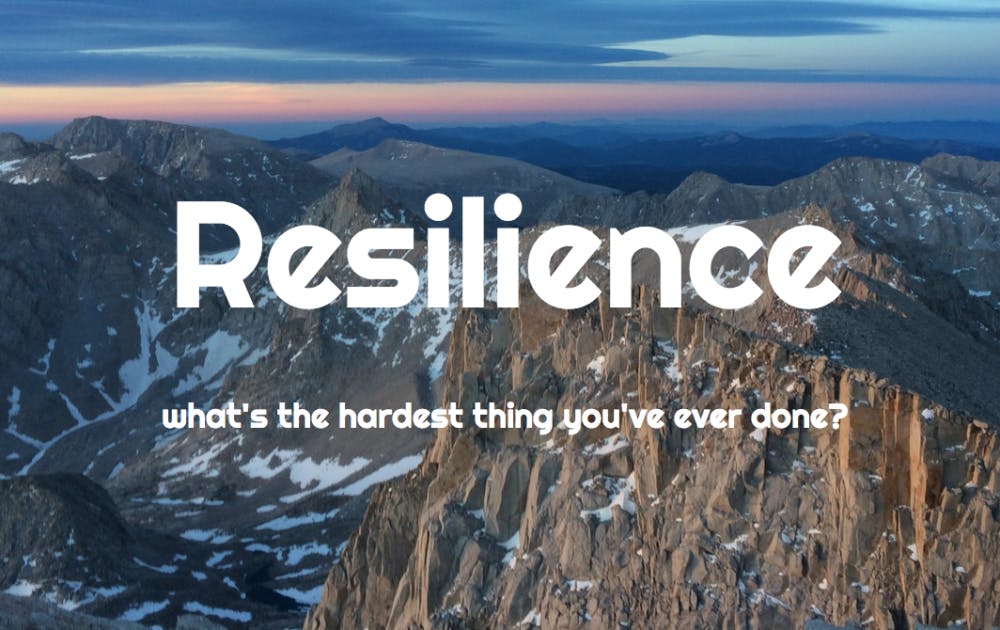On a typical crisp autumn night in Brooker last semester, Cooper Couch ’14.5 was curious about his new housemates. Curled up besides the cozy warmth of a crackling fire with fellow Brooker residents, he asked Emma Erwin ’15.5 a simple question.
“What’s the hardest thing you’ve ever done?”
This question has inspired dozens of Middlebury students to share stories on tackling their own private struggles. Originally an online platform for story submissions (read them at go/resilience), Project Resilience culminated with a two-hour storytelling event that took place in McCullough on January 20. At 8 P.M., students gathered in Wilson Hall to listen to their peers share their battles against depression, anorexia, anxiety, family deaths, and other personal struggles.
“The hardest things are often the most difficult to acknowledge, reflect on and share; but they are often the most critical, and that’s why I decided to use this prompt for [Project Resilence],” Erwin said.
The idea of writing to heal is not new. An article published in The New York Times earlier this January cited two studies, one at Duke University and another at Stanford, on the benefits of personal story-telling. Both showed that listening to peers who faced similar struggles led to long-term increased satisfaction with their college experiences. Researchers believed this exercise helped students change their personal narratives from “I don’t belong here”, to one of positivity and resilience, “I can get through this.”
“I was interested to see what everyone else was going through”, said Rachael Salerno ’18, who was also in-attendance. “I’ve had a blessed life and I’ve kind of been blind to what other people have been through.”
Jessica Chen ’17 echoed, “The respect I have for the people who shared their stories is two-part. For having the strength to survive that particular struggle. And for having the courage to write and speak about it publicly.”
Though some students were drawn to the event to support friends who were sharing their stories, others admitted the free cupcakes catered by MiddCakes were especially tempting. Regardless of the reason, every seat was filled; even the floor was packed with cross-legged attendees sitting shoulder to shoulder.
Mara Gans ’15.5, who shared her story at the event, was not surprised by the large turn-out. “These [mental/emotional] issues are something everyone can relate to,” she said. For her, the most rewarding part of the evening was watching the audience’s reactions as she spoke. Watching people hug each other or quietly release a couple tears was particularly moving.
“At the end of the day, it’s not about my story and it’s not about me speaking. It’s about this campus being a place where we can have these kinds of conversations, [where] this ‘harder’ side of us is something we can share,” she said.
Though Cole Bortz ’17, who attended the event, could not directly relate to any of the stories he heard, the speakers still impressed him. “It’s just nice to be around people being so honest. You don’t necessarily get that a lot. Especially with people you don’t know. And even with people you do know.”
Gans has also spoken at “It Happens Here”, a similar story-telling event focusing on sexual assault. She described sharing her story for Project Resilience as more of a community-based experience. “[It Happens Here] was about recognizing my own struggle and my own story,” she said. “I felt like this project [Resilience] was more about community and realizing that we all go through things. Providing hope to other people.”
For Salerno, listening to struggles of her peers helped put her own life into perspective. “You never know what people are going through,” she said, highlighting the importance of being kinder to everyone in daily interactions.
This event may have opened the door, even if only a slight crack, to a more honest and open-minded campus culture. “A campus that’s more empathetic and more willing to listen to what other people have to say,” Gans said.
“The truth is, everyone has a story,” Erwin said “Whether you’re someone who has faced some serious struggles of your own, or not, it’s important to support those who are sharing and to acknowledge the parts of your own life that have been difficult to handle.”
New Project Resilience Goes Live with Stories

Comments


